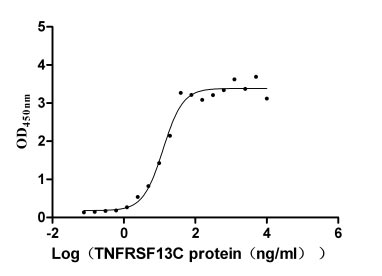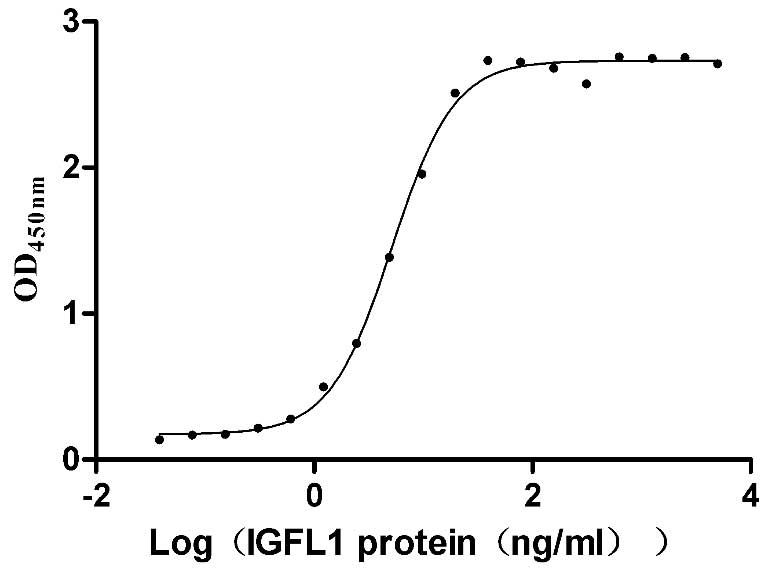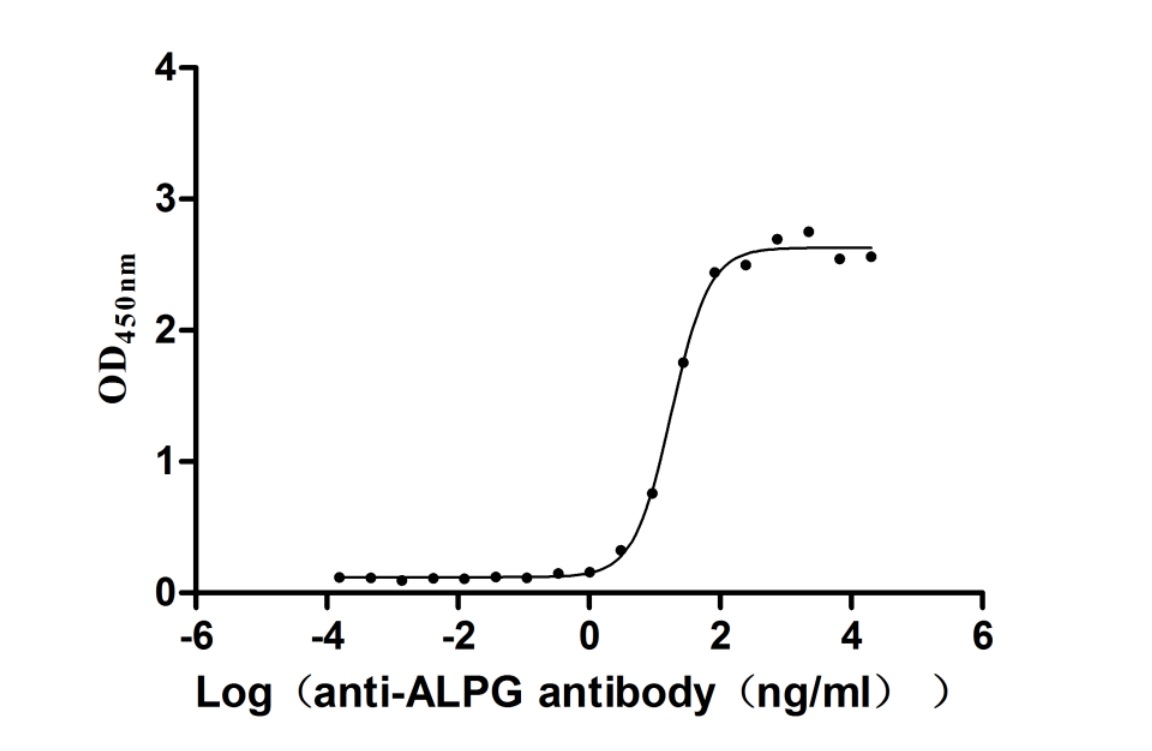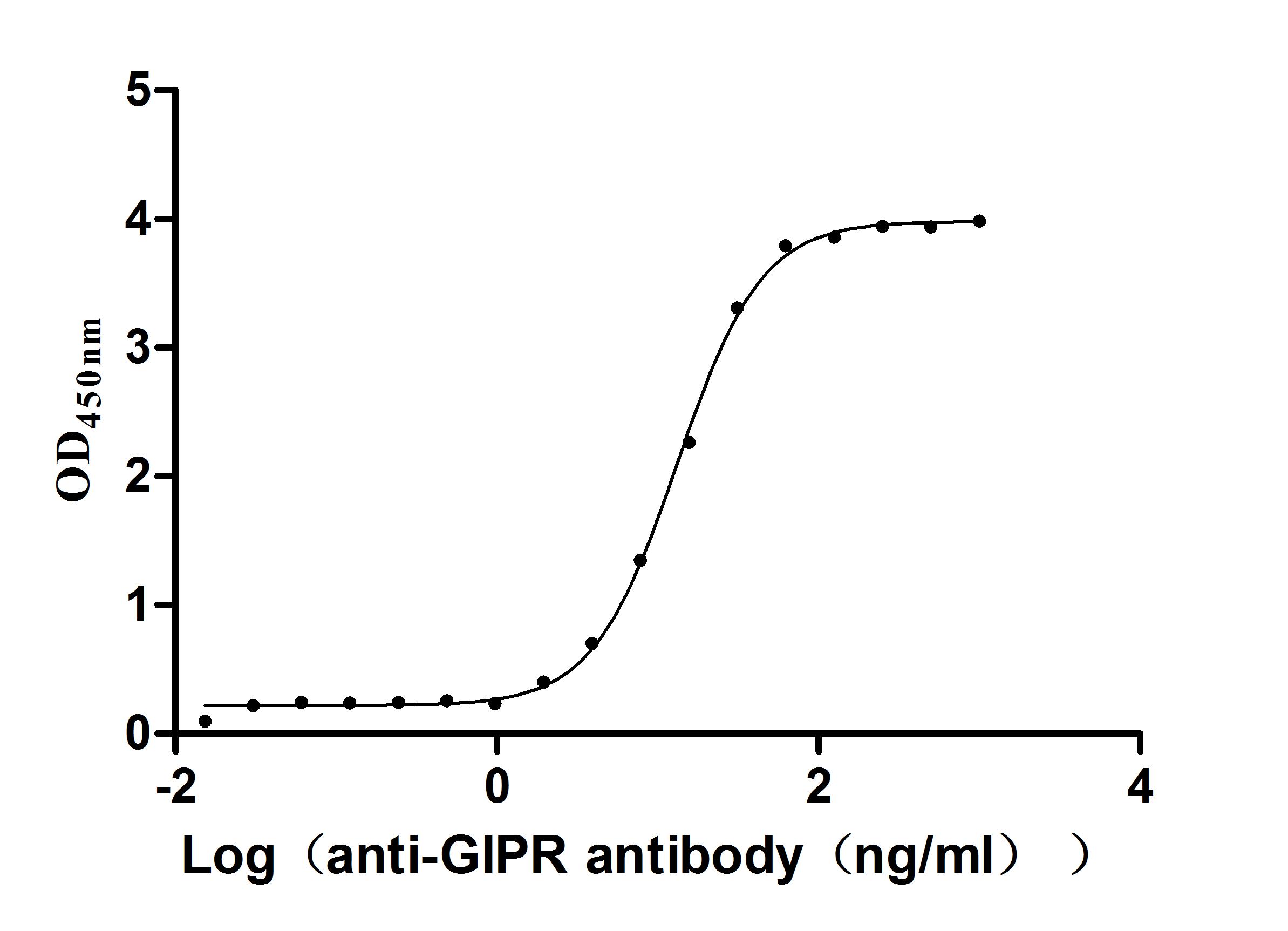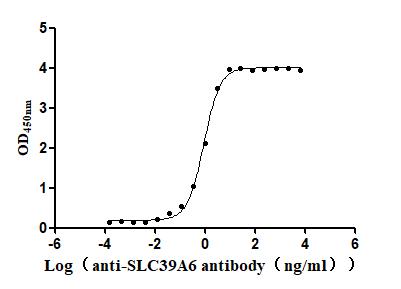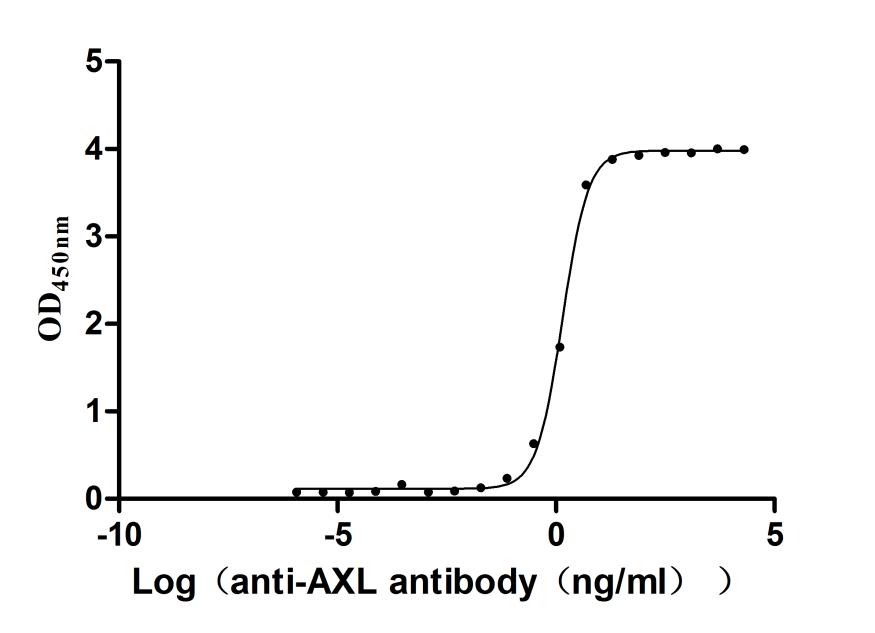Recombinant Human Hypoxia-inducible factor 3-alpha (HIF3A)
-
中文名称:人HIF3A重组蛋白
-
货号:CSB-YP896696HU
-
规格:
-
来源:Yeast
-
其他:
-
中文名称:人HIF3A重组蛋白
-
货号:CSB-EP896696HU
-
规格:
-
来源:E.coli
-
其他:
-
中文名称:人HIF3A重组蛋白
-
货号:CSB-EP896696HU-B
-
规格:
-
来源:E.coli
-
共轭:Avi-tag Biotinylated
E. coli biotin ligase (BirA) is highly specific in covalently attaching biotin to the 15 amino acid AviTag peptide. This recombinant protein was biotinylated in vivo by AviTag-BirA technology, which method is BriA catalyzes amide linkage between the biotin and the specific lysine of the AviTag.
-
其他:
-
中文名称:人HIF3A重组蛋白
-
货号:CSB-BP896696HU
-
规格:
-
来源:Baculovirus
-
其他:
-
中文名称:人HIF3A重组蛋白
-
货号:CSB-MP896696HU
-
规格:
-
来源:Mammalian cell
-
其他:
产品详情
-
纯度:>85% (SDS-PAGE)
-
基因名:HIF3A
-
Uniprot No.:
-
别名:Basic-helix-loop-helix-PAS protein MOP7; bHLHe17; Class E basic helix-loop-helix protein 17; HIF 3A; HIF 3A4; HIF-3-alpha; HIF3 alpha; HIF3-alpha; HIF3-alpha-1; HIF3A; HIF3A_HUMAN; Hypoxia Inducible Factor 3 alpha; Hypoxia inducible factor 3 alpha subunit; Hypoxia inducible factor three alpha ; Hypoxia-inducible factor 3-alpha; Inhibitory PAS domain protein; IPAS; Member of PAS protein 7; MOP7; PAS domain-containing protein 7; PASD7
-
种属:Homo sapiens (Human)
-
蛋白长度:full length protein
-
表达区域:1-669
-
氨基酸序列MALGLQRARS TTELRKEKSR DAARSRRSQE TEVLYQLAHT LPFARGVSAH LDKASIMRLT ISYLRMHRLC AAGEWNQVGA GGEPLDACYL KALEGFVMVL TAEGDMAYLS ENVSKHLGLS QLELIGHSIF DFIHPCDQEE LQDALTPQQT LSRRKVEAPT ERCFSLRMKS TLTSRGRTLN LKAATWKVLN CSGHMRAYKP PAQTSPAGSP DSEPPLQCLV LICEAIPHPG SLEPPLGRGA FLSRHSLDMK FTYCDDRIAE VAGYSPDDLI GCSAYEYIHA LDSDAVSKSI HTLLSKGQAV TGQYRFLARS GGYLWTQTQA TVVSGGRGPQ SESIVCVHFL ISQVEETGVV LSLEQTEQHS RRPIQRGAPS QKDTPNPGDS LDTPGPRILA FLHPPSLSEA ALAADPRRFC SPDLRRLLGP ILDGASVAAT PSTPLATRHP QSPLSADLPD ELPVGTENVH RLFTSGKDTE AVETDLDIAQ DADALDLEML APYISMDDDF QLNASEQLPR AYHRPLGAVP RPRARSFHGL SPPALEPSLL PRWGSDPRLS CSSPSRGDPS ASSPMAGARK RTLAQSSEDE DEGVELLGVR PPKRSPSPEH ENFLLFPLSL SFLLTGGPAP GSLQDPSTPL LNLNEPLGLG PSLLSPYSDE DTTQPGGPFQ PRAGSAQAD
-
蛋白标签:Tag type will be determined during the manufacturing process.
The tag type will be determined during production process. If you have specified tag type, please tell us and we will develop the specified tag preferentially. -
产品提供形式:Lyophilized powder
Note: We will preferentially ship the format that we have in stock, however, if you have any special requirement for the format, please remark your requirement when placing the order, we will prepare according to your demand. -
复溶:We recommend that this vial be briefly centrifuged prior to opening to bring the contents to the bottom. Please reconstitute protein in deionized sterile water to a concentration of 0.1-1.0 mg/mL.We recommend to add 5-50% of glycerol (final concentration) and aliquot for long-term storage at -20℃/-80℃. Our default final concentration of glycerol is 50%. Customers could use it as reference.
-
储存条件:Store at -20°C/-80°C upon receipt, aliquoting is necessary for mutiple use. Avoid repeated freeze-thaw cycles.
-
保质期:The shelf life is related to many factors, storage state, buffer ingredients, storage temperature and the stability of the protein itself.
Generally, the shelf life of liquid form is 6 months at -20°C/-80°C. The shelf life of lyophilized form is 12 months at -20°C/-80°C. -
货期:Delivery time may differ from different purchasing way or location, please kindly consult your local distributors for specific delivery time.Note: All of our proteins are default shipped with normal blue ice packs, if you request to ship with dry ice, please communicate with us in advance and extra fees will be charged.
-
注意事项:Repeated freezing and thawing is not recommended. Store working aliquots at 4°C for up to one week.
-
Datasheet :Please contact us to get it.
相关产品
靶点详情
-
功能:Acts as a transcriptional regulator in adaptive response to low oxygen tension. Acts as a regulator of hypoxia-inducible gene expression. Functions as an inhibitor of angiogenesis in hypoxic cells of the cornea. Plays a role in the development of the cardiorespiratory system. May also be involved in apoptosis.; Attenuates the ability of transcription factor HIF1A to bind to hypoxia-responsive elements (HRE) located within the enhancer/promoter of hypoxia-inducible target genes and hence inhibits HRE-driven transcriptional activation. Also inhibits hypoxia-inducible ARNT-mediated gene expression.; Attenuates the ability of transcription factor HIF1A to bind to hypoxia-responsive elements (HRE) located within the enhancer/promoter of hypoxia-inducible target genes and hence inhibits HRE-driven transcriptional activation.; Attenuates the ability of transcription factor HIF1A and EPAS1/HIF2A to bind to hypoxia-responsive elements (HRE) located within the enhancer/promoter of hypoxia-inducible target genes and hence inhibits HRE-driven transcriptional activation. May act as a tumor suppressor and inhibits malignant cell transformation.; Attenuates the ability of transcription factor HIF1A to bind to hypoxia-responsive elements (HRE) located within the enhancer/promoter of hypoxia-inducible target genes and hence inhibits HRE-driven transcriptional activation.
-
基因功能参考文献:
- data suggest an important role of miR-210 in sustaining HIF-1alpha activity via the suppression of HIF-3alpha, regulating cell growth and chemotherapeutic drug resistance in cholangiocarcinoma. PMID: 29953500
- AA can protect cardiomyocytes against hypoxia-induced apoptosis through regulating the miR-1290/HIF3A/HIF-1alpha axis, and miR-1290 may be a potential target in the prevention of myocardial ischemia-reperfusion injury PMID: 28686797
- NAP peptide prevents outer blood retinal barrier breakdown by reducing HIF1alpha/HIF2alpha, VEGF/VEGFRs, and increasing HIF3alpha expression Moreover it is able to reduce the percentage of apoptotic cells by modulating the expression of two death related genes, BAX and Bcl2. PMID: 28436035
- HIF3A methylation was found in the association between the HIF3A rs3826795 polymorphism and alanine aminotransferase among obese children. PMID: 28754107
- TIMP2 suppression, in a hypoxic environment, was induced through a regulatory feedback circuit consisting of hypoxia-inducible factor (HIF) 1 alpha, microRNA-210 (miR-210), and HIF-3alpha. PMID: 27018975
- Results were discordant with those expected if HIF3A methylation has a causal effect on body mass index (BMI) & provided more evidence for causality in the reverse direction (i.e., an effect of BMI on HIF3A methylation); results also show a long-lasting intergenerational influence of maternal BMI on offspring methylation at this locus, which may confound associations between own adiposity & HIF3A methylation. PMID: 26861784
- DNA methylation in HIF3A shares moderate correlation between adipose tissue and blood, and both are associated with BMI. In contrast, methylation in FASN is poorly correlated across tissues, but the DNA methylation in adipose tissue but not blood is highly associated with BMI PMID: 26891033
- Reduced lifetimes of the donor were partially restored by coexpression of HIF-1alpha or Bcl-xL, binding proteins of IPAS in the nucleus and mitochondria, respectively. PMID: 28003430
- Results confirmed a positive association between BMI and HIF3A DNA promoter methylation in the blood. The tissue-specific results of HIF3A gene expression indicate that subcutaneous adipose tissue is the more functional tissue in which a low expression may adversely affect whole-body insulin sensitivity. PMID: 27594926
- Parkin is downregulated under hypoxia and that it interferes with HIF expression based on cellular oxygen tension. PMID: 26742768
- miR210 may be a negative regulator of the progression of osteoarthritis, which increases chondrocyte proliferation and prompts extracellular matrix deposition by directly targeting HIF3alpha. PMID: 26861791
- This provides a compelling model for how hypoxia-induced miR-429 regulates the switch between HIF-1 adaptive responses to HIF-3 survival responses by rapidly decreasing HIF1A levels while simultaneously slowing the progression of HIF3A expression until the miR-429 levels drop below normoxic levels. PMID: 26954587
- The association between increased DNA methylation at HIF3A and increased adiposity is present in neonates. PMID: 26011824
- Unsaturated fatty acids are high-affinity ligands of the C-terminal domain from the HIF-3alpha. PMID: 26237540
- HIF3A DNA Methylation Is Associated with Childhood Obesity and ALT PMID: 26717317
- HIF3alpha has a transcriptional regulatory function, which negatively affects gene expression by competing with HIF1alpha and HIF2alpha in binding to transcriptional elements in target genes during hypoxia. (Review) PMID: 25936862
- inverse association with hypertrophic markers in chondrogenic cells PMID: 26174816
- A DNA methylation variant in HIF3A was associated with BMI changes through interactions with total or supplemental vitamin B2, vitamin B12, and folate. PMID: 26001398
- Here we provide evidence for the miRNA mediated regulation of HIF3a by hypoxia responsive miRNAs in STS, which may help to tightly regulate and fine-tune the hypoxic response. PMID: 24927770
- The Inhibitory Per/Arnt/Sim (PAS) domain protein (IPAS) is a splice variant of hypoxia-inducible factor (HIF)-3alpha, and possesses two entirely different functions. The results strongly suggest that IPAS is a nucleocytoplasmic shuttling protein. PMID: 24092767
- These findings highlight the importance of the hypoxia-sensing pathway and HIFs in clinical hematology. PMID: 24371328
- Were significantly upregulated in the HIF3alpha expressing lungs. PMID: 23451260
- the transcription of HIF-3alpha4 was silenced by the promoter DNA methylation in meningiomas, and inducible HIF-3alpha4 impaired angiogenesis, proliferation, and metabolism/oxidation in hypervascular meningiomas PMID: 23485455
- data indicate that the HIF-3alpha variants may have more versatile and specific roles in the regulation of the hypoxia response than previously anticipated PMID: 21479871
- Cell-specific and hypoxia-dependent regulation of human HIF-3alpha. PMID: 21069422
- It is a negative regulator of tumorigenesis. (review) PMID: 21404626
- HIF3A is regulated by hypoxia in the developing human lung. PMID: 20551700
- Hypoxia upregulated transcription from all three alternative HIF-3alpha promoters. siRNA experiments showed that this induction is mediated specifically by HIF-1 and not by HIF-2. PMID: 20416395
- multiple splice variants of locus are targets of the von Hippel-Lindau E3 ubiquitin ligase complex PMID: 12538644
- IPAS1 and IPAS2 inhibit angiogenesis by binding to and inhibiting HIF-1alpha and HIF-1beta. PMID: 16182248
- findings suggest that HIF-3alpha, as a member of the HIF system, is complementary rather than redundant to HIF-1alpha induction in protection against hypoxic damage in alveolar epithelial cells. PMID: 16775626
- The expression of HIF-3alpha4 suppresses the growth of tumor xenografts in SCID mice. PMID: 17998805
- The findings shed light on a novel aspect of HIF-3alpha as a HIF-1 target gene and point to a possible role as a modulator of hypoxic gene induction. PMID: 19694616
- The splice isoform HIF-3alpha4 inhibits transcription of VEGF and GLUT1 by binding to and inhibiting HIF-1alpha and HIF-1beta. PMID: 16126907
显示更多
收起更多
-
亚细胞定位:Nucleus. Cytoplasm. Nucleus speckle. Mitochondrion.
-
组织特异性:Expressed in vascular cells (at protein level). Expressed in kidney. Expressed in lung epithelial cells. Expressed in endothelial cells (venous and arterial cells from umbilical cord and aortic endothelial cells) and in vascular smooth muscle cells (aorta
-
数据库链接:
HGNC: 15825
OMIM: 609976
KEGG: hsa:64344
STRING: 9606.ENSP00000366898
UniGene: Hs.420830
Most popular with customers
-
Express system: Mammalian cell
Species: Homo sapiens (Human)
-
Recombinant Human IGF-like family receptor 1 (IGFLR1), partial (Active)
Express system: Mammalian cell
Species: Homo sapiens (Human)
-
Recombinant Human Zymogen granule protein 16 homolog B (ZG16B) (Active)
Express system: Mammalian cell
Species: Homo sapiens (Human)
-
Recombinant Human Alkaline phosphatase, germ cell type (ALPG) (Active)
Express system: Mammalian cell
Species: Homo sapiens (Human)
-
Recombinant Macaca fascicularis Gastric inhibitory polypeptide receptor (GIPR), partial (Active)
Express system: yeast
Species: Macaca fascicularis (Crab-eating macaque) (Cynomolgus monkey)
-
Recombinant Macaca fascicularis Zinc transporter ZIP6 isoform X1(SLC39A6),partial (Active)
Express system: Baculovirus
Species: Macaca fascicularis (Crab-eating macaque) (Cynomolgus monkey)
-
Recombinant Human Tyrosine-protein kinase receptor UFO(AXL),partial (Active)
Express system: Mammalian cell
Species: Homo sapiens (Human)


